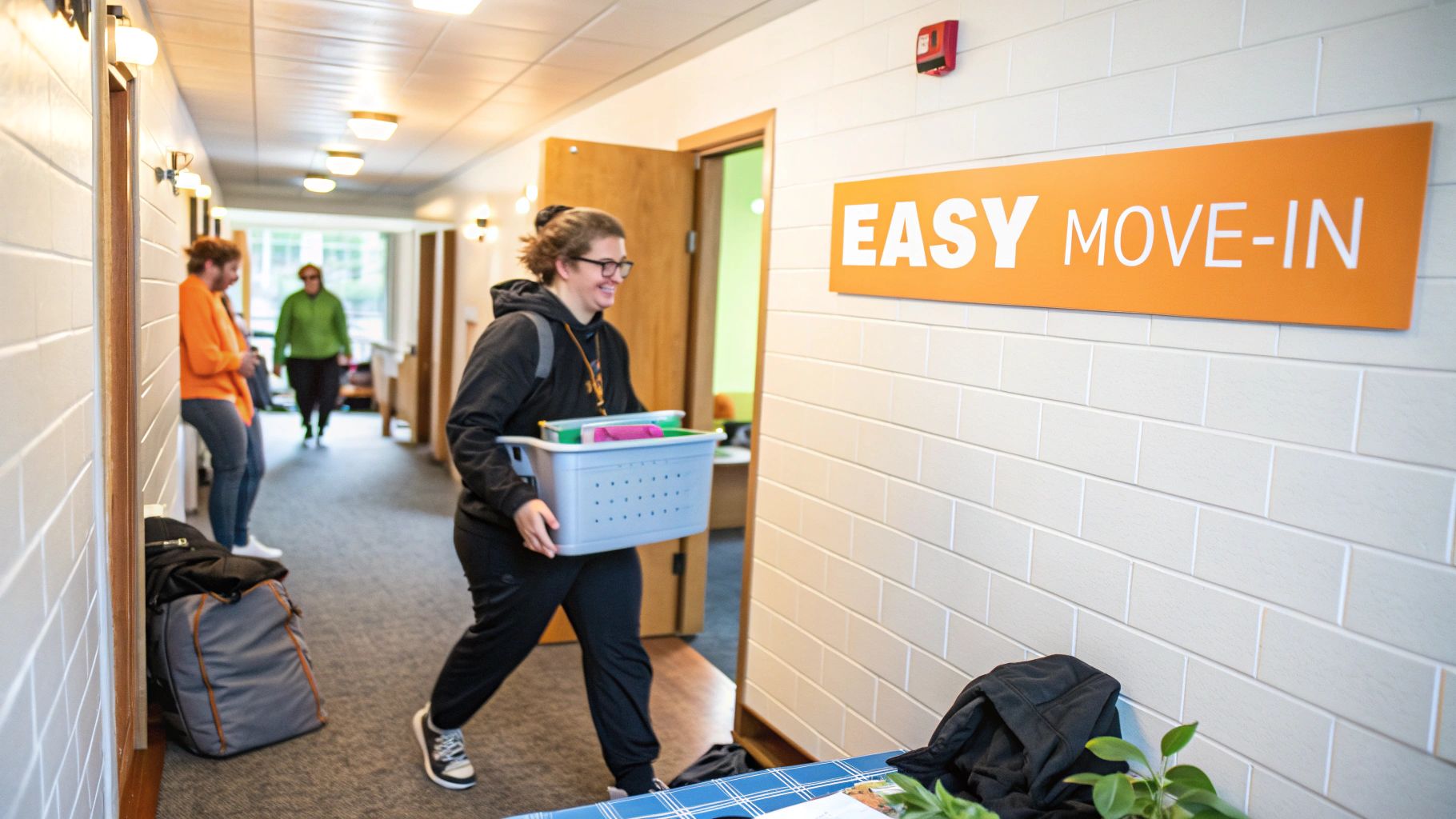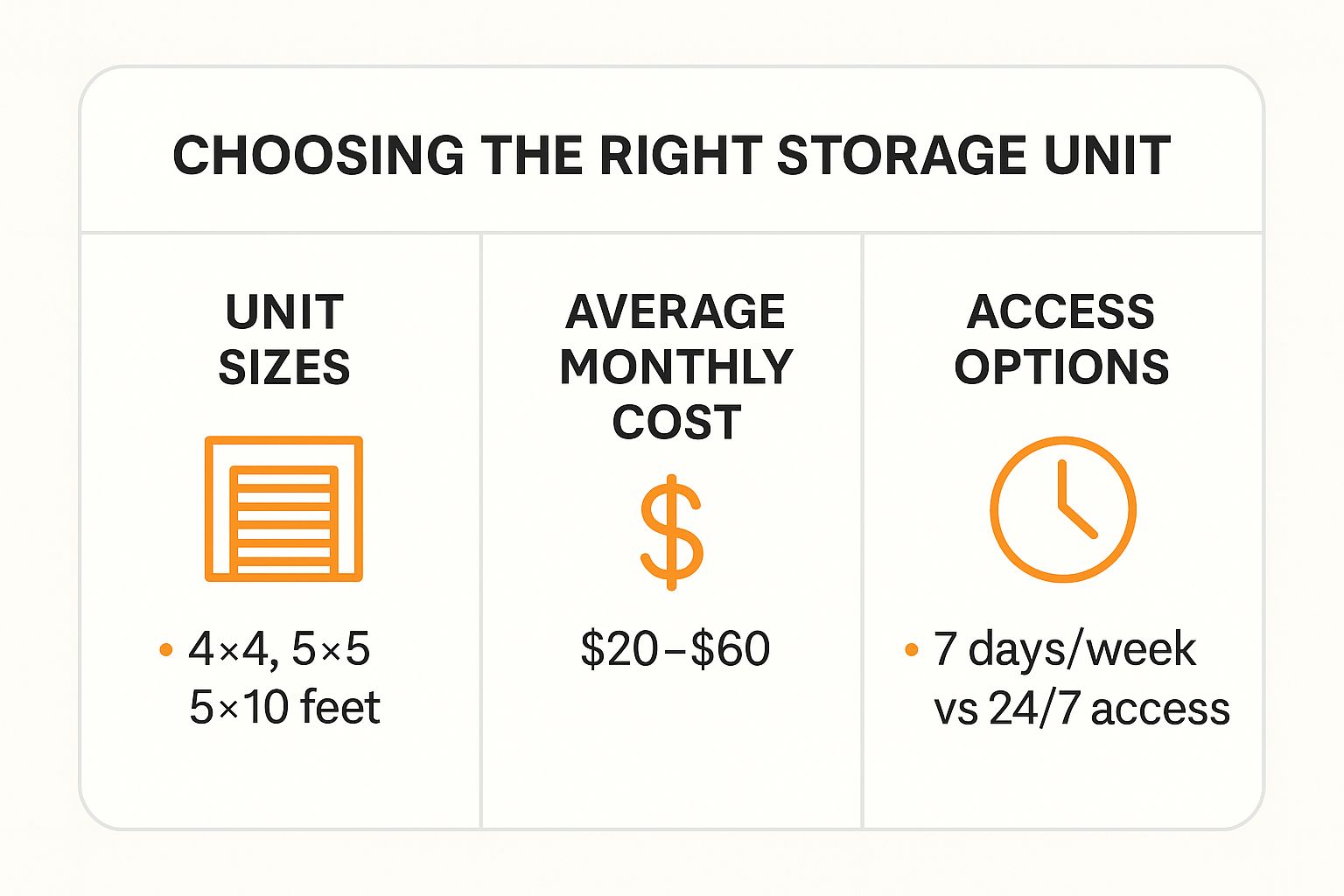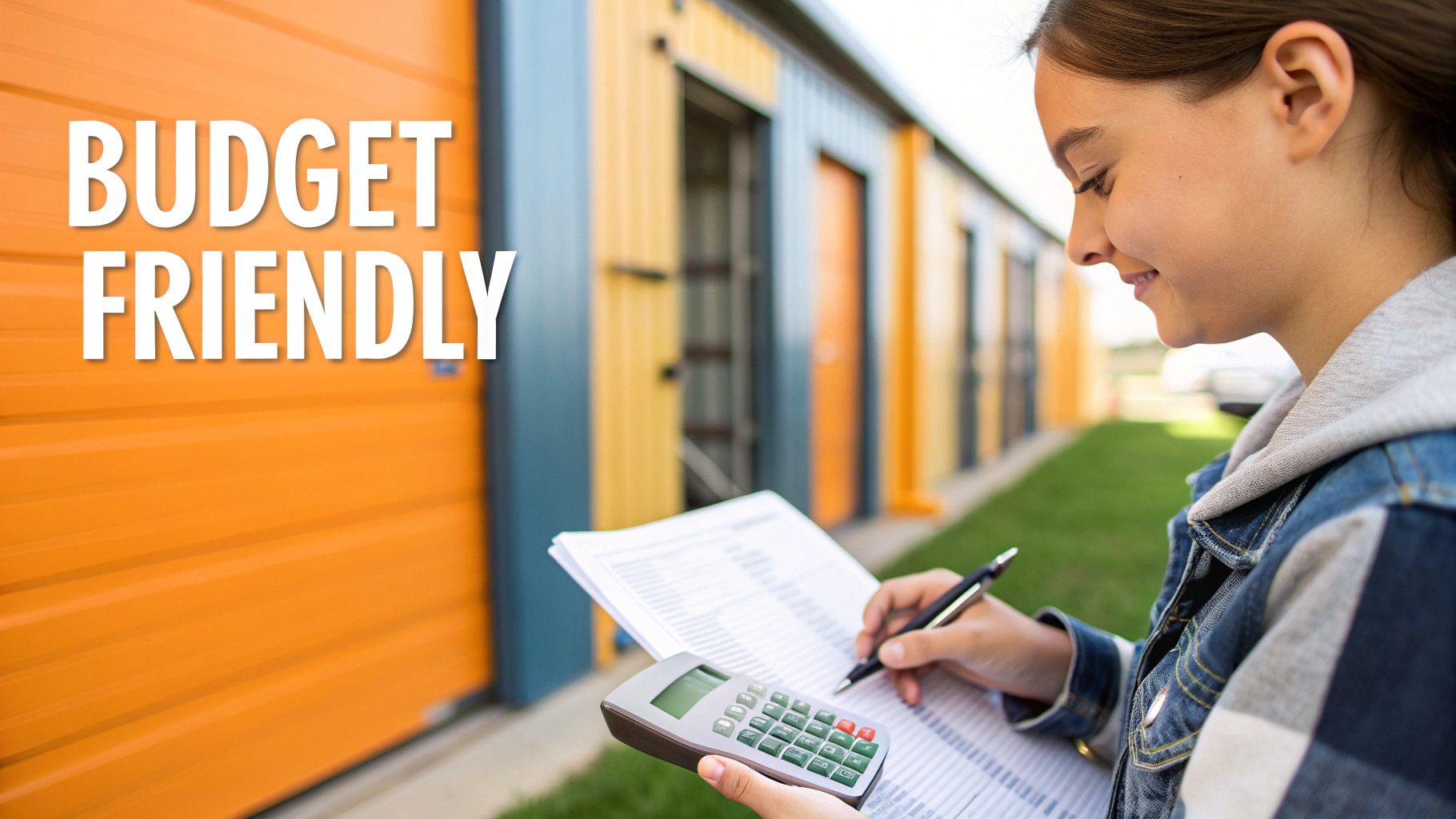Self-storage for students is a game-changer. It gives you a secure, flexible space to keep your belongings during term breaks, when you're moving between flats, or just to reclaim some floor space in a tiny university room. It’s an affordable fix for the massive headache of dragging everything back home for the summer, giving you peace of mind that your stuff is safe.
Why Student Storage Is a University Lifesaver
Let's be real, "spacious" is probably the last word anyone would use to describe student accommodation. Between textbooks, your winter wardrobe, sports gear, and everything else, your room can start feeling less like a place to study and more like a cluttered cupboard. This is where self-storage for students goes from being a nice idea to an absolute necessity for a stress-free uni experience.
Free Up Your Living Space
Instead of tripping over suitcases or trying to hide your surfboard under your bed, a storage unit gives you room to breathe. A tidy space means a tidy mind, which is exactly what you need when exams and deadlines are looming. Think of it as an extension of your wardrobe or an off-site garage, perfect for things like:
- Seasonal Items: Storing bulky winter coats, duvets, and boots during the summer.
- Hobby Gear: Keeping sports equipment, musical instruments, or art supplies safe without taking over your room.
- End-of-Term Clear-Outs: Moving non-essential items out before the big end-of-year pack-up.
This isn't a niche trick anymore; it's becoming standard practice. The UK self-storage market was valued at around £1.08 billion in 2023, and student demand is a huge part of that. With over 2,200 facilities across the country, finding a solution for cramped student living has never been easier.
Simplify Summer and Holiday Moves
The biggest logistical nightmare for any student is the summer break. Do you really want to hire a van to haul all your stuff back to your parents' house, only to drag it all back again in September? It's not just expensive; it’s incredibly stressful.
A self-storage unit near your university acts as your secure home base. You can leave everything safely packed away, ready for your return. No more exhausting cross-country trips with a car crammed to the ceiling.
This approach saves time, money, and a fair few family arguments. You can just lock up your unit and actually enjoy your break without worrying about your possessions. For a deeper look at how much easier this can make your life, you can explore the key benefits of using self storage in our detailed guide.
How to Find the Right Student Storage Unit
Choosing a self-storage unit is about more than just finding the cheapest deal online. For students, it’s a tricky balancing act between location, price, and security. Nailing that trifecta is the key to a stress-free experience, ensuring your stuff stays safe without emptying your student loan.
Think of it as a triangle of priorities. You’ve got the sheer convenience of a facility next to campus on one corner. On another, the budget-friendly price of a unit a bit further out. And the third corner? That’s the non-negotiable need for solid security. Your perfect solution is somewhere in the middle.
Location Versus Cost: The Student Dilemma
A storage facility a five-minute walk from your halls is a dream, especially if you don’t have a car. You can pop over to drop off or pick up things between lectures. But, as you’d expect, that level of convenience usually comes with a higher price tag.
On the flip side, a unit a few miles out of the city centre can offer some serious savings. If you only plan on accessing your things at the start and end of term, that extra travel time could be well worth the lower monthly cost.
The real question is how you’ll use the storage. For frequent visits, location is king. For long-term summer storage, chase the better price. A quick taxi or bus ride twice a year is a lot cheaper than paying a premium for twelve weeks straight.
Recent research really drives this point home. When picking a provider, 83% of young consumers put price first, while 68% value proximity. It shows that while budget is the top concern, convenience isn't far behind. You can read the full research on how students are driving self-storage demand to get a better feel for these trends.
Must-Have Security Features
While you can be flexible on location and price, security is where you don't compromise. Your belongings, from your pricey laptop to sentimental bits from home, need proper protection. Never settle for a facility that cuts corners on safety.
Here are the absolute essentials to look for:
- 24/7 CCTV Monitoring: Look for visible cameras covering all the key spots—entrances, exits, and hallways. It’s a huge deterrent for thieves and provides a record if anything does go wrong.
- Secure Perimeter Fencing and Gated Access: The entire facility should be properly enclosed with controlled access, usually needing a unique PIN code or key fob. This makes sure only paying customers can get onto the premises.
- Individually Alarmed Units: This isn’t standard everywhere, but individual alarms are a fantastic extra layer of protection. They'll alert staff if anyone tries to tamper with your specific unit.
- Good Lighting: A well-lit facility, inside and out, is vital for your personal safety, especially if you need to access your unit after dark.
Finding a place that ticks all these boxes will give you proper peace of mind. For a more detailed guide, check out our 10 tips for choosing a self-storage facility, which offers a complete checklist.
Finally, always ask about student-specific deals. Many companies offer discounts or special packages for students, but they aren't always splashed across the homepage. A quick phone call or email can uncover some hidden savings that make a secure, well-located unit even more affordable. By weighing up these factors, you can confidently find a storage solution that fits both your needs and your budget.
Choosing Your Perfect Storage Unit Size
One of the biggest financial traps for students booking self storage is paying for space you just don't need. Let's face it, visualising cubic metres is confusing, so we'll break it down into real-world terms that actually make sense for a student.
Getting the size right isn't just about saving a bit of cash; it's about making your move-in and move-out days a whole lot less stressful.
Don't just guess and hope for the best. Taking ten minutes to quickly inventory your belongings before you book will ensure you get the most cost-effective unit. Lay everything out, or even just make a quick list on your phone. This gives you a realistic idea of what you actually need to store.
Here's a quick look at the key things to think about, from common unit sizes to access options.
As you can see, the jump from a small locker to a unit big enough for furniture comes with a noticeable price difference. This is exactly why a quick inventory is so crucial!
A Quick Guide to Student Storage Sizes
To help you get a better feel for what you might need, we've put together a simple table. Think of it as a cheat sheet for matching your stuff to the right-sized space.
| Unit Size (sq ft) | Equivalent To | What It Can Hold | Ideal For |
|---|---|---|---|
| 10 – 15 | A small locker/cupboard | Several boxes, suitcases, winter clothes, a couple of small appliances. | The minimalist packer or storing items over summer. |
| 25 – 35 | A garden shed | A single mattress, desk, chair, bicycle, and plenty of boxes. | Clearing out a standard-sized student dorm room. |
| 50 | A large walk-in wardrobe | Contents of a small studio flat, including a sofa, bed, and multiple boxes. | Students sharing a unit or storing a studio apartment. |
| 75+ | Half a single garage | Furniture from a one-bedroom flat, including larger items like bookcases and TVs. | Storing the contents of a whole flat or sharing with friends. |
This table should give you a solid starting point, but remember to think about how you'll pack. Good stacking can make a smaller unit feel much bigger.
Common Student Storage Scenarios
To make it even clearer, let's look at a couple of common situations. Which one sounds more like you?
-
The Minimalist Packer: Are you just storing a few large suitcases, a decent number of boxes filled with books, and maybe your bulky winter wardrobe? If so, a 10-15 sq ft unit is probably perfect. Think of it as a big cupboard – ideal for those who travel light between terms.
-
The Full Room Clear-Out: If you're packing up the entire contents of a typical student room, you'll need more breathing room. A 25-35 sq ft unit is a much safer bet. This size can comfortably handle a single mattress, a desk, a chair, your bike, and stacks of boxes.
Visualising the Space You Need
Still struggling to picture it? A 25 sq ft unit is roughly the size of a small garden shed. It gives you enough floor space and, crucially, enough height to stack your boxes efficiently while still leaving a narrow path to reach things at the back.
Don't just think about floor space; remember to use vertical height! Sturdy, well-packed boxes can be stacked high, which maximises the volume of your unit. This simple trick might even let you rent a smaller, cheaper size.
For a more precise calculation, it's always helpful to use a dedicated tool. To get a personalised recommendation based on your specific items, you can learn more about how much storage space you might need with our detailed size estimator. It's the best way to avoid the common mistake of overspending.
Ultimately, a bit of planning goes a long way. By matching your inventory to the right unit size, you can secure a space that fits both your belongings and your student budget perfectly.
Smart Packing Strategies to Maximize Space
How you pack your stuff has a direct impact on how much space you need and, let’s be honest, how much you end up paying. But smart packing is more than just playing Tetris with your boxes; it's about making sure your belongings are protected and that unpacking isn't a total nightmare later on. Getting your packing technique right is a cornerstone of affordable self storage for students.
The whole process kicks off with getting the right materials. Before you splash out on brand-new boxes, it’s worth asking at local supermarkets or shops. They often have sturdy cardboard boxes they're happy to give away for free—just give them a quick check to make sure they're clean and dry to avoid any unwanted pests or mould.
Packing Your Items Securely
With boxes in hand, your focus should shift to protecting what goes inside. Every item needs a slightly different touch, especially when you're dealing with delicate electronics or bulky bedding that can eat up valuable space.
- Electronics: Wrap things like TVs, monitors, and speakers in bubble wrap or even old blankets for cushioning. If you’ve still got the original boxes, use them—they’re designed for a perfect, protective fit. Always pack the cables in the same box and label them clearly to avoid a frantic search down the line.
- Fragile Goods: Use plenty of packing paper, or get creative with towels and t-shirts, to cushion plates, glasses, and anything else that's breakable. Pack them snugly into smaller boxes so they have no room to shift and rattle during the move.
- Clothes and Bedding: Here’s where you can really reclaim a massive amount of space. Vacuum-sealed bags are an absolute game-changer for students, shrinking bulky duvets, pillows, and winter coats down to a fraction of their size.
A classic mistake is overfilling boxes. It makes them impossible to lift and much more likely to split open. A good rule of thumb is to keep any single box under 15 kg. Use your smaller boxes for heavy things like books and save the larger ones for lighter, bulkier items like bedding.
Proper packing not only helps you get the most out of your unit but also ensures everything comes out in the same condition it went in. For a more detailed walkthrough, you can learn how to pack your storage unit with our step-by-step guide, which covers everything from the initial prep to getting it all arranged perfectly.
Organise and Label Everything
A simple but effective labelling system will save you hours of frustration. Trust me, when you're rushing to find your kettle and textbooks during freshers' week, you'll thank yourself for taking a few extra minutes to get organised now.
Grab a thick marker and label each box on at least two sides with its contents and the room it belongs in (e.g., "KITCHEN – Mugs & Kettle" or "BEDROOM – Textbooks & Notes"). This turns unpacking into a logical, room-by-room job instead of a chaotic free-for-all.
Want to take it a step further? Create a quick inventory list on your phone or in a notepad. Just number each box and jot down a brief summary of what's inside. It's invaluable for finding one specific item without tearing every box open. Plus, it serves as a handy record for insurance purposes, giving you complete peace of mind while your stuff is tucked away.
Unlocking Student Discounts and Storage Deals
As a student, making your loan stretch as far as possible is a top priority. The good news is that the world of self storage for students is packed with deals and discounts designed to make it more affordable. You just need to know where to look and what questions to ask to find the best possible package for your needs.
Many facilities actively court the student market, so you should never assume the price you see online is the final price. Always ask if they have a specific student discount. It’s a simple question that can knock a decent percentage off your monthly rate and lead to some serious savings over a few months.
On top of a straightforward discount, keep your eyes peeled for introductory offers. These are incredibly common in the storage industry and are pretty much perfect for short-term student contracts over the summer holidays.
Finding the Best Introductory Offers
Headline deals are designed to catch your eye, and for good reason—they can offer huge value. Keep an eye out for these common promotions, which are ideal for student timelines:
- First Month Free: This is a fantastic deal if you plan to store for three or four months. It effectively gives you a significant discount on your total storage cost.
- 50% Off for the First 8 Weeks: Just like the 'first month free' offer, this provides a major saving at the start of your contract, lowering that initial financial hit.
Always read the small print on these offers. Some might require a minimum storage period, so double-check that the terms align with your summer break or end-of-term needs to avoid any unexpected charges.
The UK self storage market has adapted well to the student calendar. Companies like Big Yellow Self Storage frequently offer up to 50% off for new customers and sometimes throw in perks like van hire credit. Other specialists, such as Lovespace, offer flexible pricing with rates as low as £9 per month for a single box. You can explore a full guide on student storage options to learn more about these specialised services.
Look Beyond the Price Tag
The cheapest unit isn't always the best value. Sometimes, add-on services can save you more money and hassle in the long run. When you're comparing facilities, make sure to ask about these valuable extras:
- Free Collection and Delivery: This is a massive perk. The cost of hiring a van, even for a few hours, can be substantial. A company that offers to pick up your belongings can save you both money and the stress of driving a huge vehicle through city traffic.
- Complimentary Padlock: It might seem like a small thing, but a high-quality padlock can easily cost £10-£20. Getting one included for free is a nice little bonus.
- Referral Discounts: Some providers will give you a discount or credit if you refer a friend. If you and your mates all need storage, you could team up and save some cash.
By looking at the complete package—the discount, the introductory offer, and any included services—you can find a deal that makes your student storage solution both incredibly convenient and genuinely budget-friendly.
Common Questions About Student Self Storage
Even with the best-laid plans, a few questions always seem to pop up when you're sorting out self storage for students for the first time. Getting straight answers quickly is the last piece of the puzzle for a totally stress-free experience. We've pulled together the most common queries to give you that final boost of confidence.
Think of this as your last-minute checklist. A quick run-through of these points will make sure you've covered all your bases, so there are no nasty surprises later on.
Do I Need Insurance for My Belongings?
Yes, you almost certainly will. While any good storage facility will have top-notch security like CCTV and gated access, their own insurance doesn't cover what’s inside your unit. It's standard practice to require you to have your own cover.
Most storage providers offer their own insurance policies, which is usually the easiest route as they’re designed specifically for stored goods. As an alternative, you could check if your parents' home insurance policy extends to cover items stored away from home, but this is less common and often has limitations.
Getting insurance isn't just a box-ticking exercise; it's about peace of mind. It protects your stuff against the unexpected, like fire, flood, or theft, making sure you’re not left out of pocket if the worst happens.
Can I Access My Unit During University Holidays?
This all comes down to the facility's access hours. Most places offer generous access, usually seven days a week, which will cover the typical university holiday periods. But it's worth remembering that some might have reduced hours on bank holidays like Christmas or Easter.
If you know you'll need to grab something over a specific holiday, it’s vital to check the access schedule beforehand. 24/7 access is a brilliant feature, but it’s not standard everywhere, so don't just assume you can pop in whenever you like. A quick look at the provider's website or a phone call will clear up their holiday hours in a minute.
What Happens If My Plans Change?
Flexibility is one of the biggest perks of using self storage as a student. University life is full of last-minute changes, and storage companies get that.
- Staying Longer? If your summer plans change or you decide to study abroad for a semester, extending your rental is usually simple. Most facilities run on a rolling monthly or weekly contract, so you just keep paying for as long as you need the space.
- Need Your Stuff Back Early? On the flip side, if you need your things back sooner than you thought, most modern facilities have flexible terms with no long-term tie-ins. You just give the required notice (if there is one) and move out.
The golden rule is to always confirm the notice period before you sign anything. Many providers, especially those who work with students, offer incredibly flexible contracts for this exact reason.
Ready to secure your belongings with a flexible, safe, and student-friendly storage solution? At Standby Self Storage, we make it easy. Book your perfect unit online in minutes and enjoy peace of mind with our 24/7 CCTV and secure facilities. Find your space today at https://www.standbyselfstorage.co.uk.





